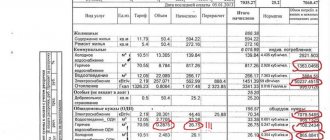Lawyer Yulia Kuznetsova answers:
The burden of maintaining the property lies with the owner.
Persons registered in residential premises must bear those utility costs that are paid according to meters. Residential property owners must bear all other utility costs in proportion to their shares of ownership. How can I avoid paying rent if I don’t live there?
I own a share in the apartment, but I don’t live there. What should I pay for?
Accordingly, bills in this case should be paid as follows:
- the owners (the author and the sister) must pay utility costs not calculated according to meters, ½ share each, regardless of the fact of living in the apartment;
- persons registered and living in residential premises (mother, author) pay for utility costs, calculated according to meters, in proportion to the number of people actually living in the residential premises;
- a person registered and not living (father) should not bear the cost of paying utility bills, with the exception of those payments that are calculated depending on the number of persons registered in the apartment;
- person actually living and not registered (husband): according to the law, your spouse is not the person who is obligated to pay expenses. However, it would be logical to pay part of the costs accrued by meters in proportion to the number of people living in the premises.
Determining the procedure for paying utility bills in shared ownership
The obligation to pay for utilities is specified in Articles 30 and 153 of the RF Housing Code. Regardless of who exactly lives in the apartment/room (the owner or the tenant), he is obliged to pay utility bills on time and in full. Moreover, even if a person does not actually live in the apartment/room in question, he is still required to pay for utilities.
Regardless of the amount of debt for utility bills, it is impossible to evict a tenant-owner of a share except by a court decision. Alternatively, you can buy out the share forcibly if it is insignificant, but this does not always work. But for utility debts, you can easily evict a tenant, because the lease agreement usually states an obligation to pay for such services.
Payments for shared ownership
Most often, the problem arises if the apartment is in shared ownership. Such a procedure for owning real estate implies the need to bear responsibility for housing exactly to the extent that a person owns.
Example: In case of common joint ownership, if such a need arises, all residents are obliged to pay for utilities equally. For example, if the payment amount is 5 thousand rubles, and 5 people live in an apartment, then each of them must pay 1 thousand rubles. With shared ownership, the amount depends on the size of the property. For example, if a person owns a share of 1/10 of an apartment, then he should pay only 1/10 of the utility bills and no more.
Recalculation of payments
Based on RF PP No. 307, any owner of real estate (including shares) has the right, if he does not live in the premises for a long time (or does not live in principle and does not rent it out), to apply for a recalculation of payments. Thanks to such a system, you can save significantly and avoid the occurrence of serious debt and, as a result, possible problems with co-owners.
Procedure
- Prepare documents proving the fact that the person does not live in his share of the apartment. Among them there should be documents stating that the same owner lives in another place and regularly pays for utilities there.
- Prepare an application for recalculation (see sample below).
- Send documents and application to the management company (management company).
- Wait for recalculation and pay for services according to the new conditions.
Documentation
An approximate list of documents for recalculation:
- Documents confirming the fact that a citizen is undergoing treatment in a sanatorium, on a business trip, a tourist trip, and so on.
- Tickets for train, plane, etc.
- Bills from hotels, motels, hostels.
- Certificate of temporary registration at another address.
- Receipts for payment of utility bills at another address.
For obvious reasons, management companies do not want to reduce their income and therefore are extremely reluctant to agree to recalculation. If you refuse, you can try to get your way through the court, but without an experienced lawyer this will be very difficult to do.
Application for recalculation
Usually the application is filled out on the spot, when submitting documents. There is no strict need to prepare it in advance.
Deadlines
Review of such applications takes about 5 days. If there is no answer within this period, you can go to the Criminal Code and clarify the fate of the document, but there is no point in swearing or demanding to work faster since strict deadlines are not established by law. But if the delay is too significant (for example, 1 month or more), you can go to court and attach to the claim your copy of the application with a note about filing with the Criminal Code.
Penalty for non-payment of utilities
Failure to pay or untimely payment of utility bills involves the accrual of a penalty in the amount of 1/300 of the refinancing rate of the Central Bank of the Russian Federation (clause 14, article 155 of the Housing Code of the Russian Federation). As of 01.2020, the refinancing rate is 6.25%. Thus, 1/300 part is approximately 0.021% per day.
However, penalties are not assessed immediately, but rather 31 days after the payment deadline has arrived. From this moment on, a penalty in the specified amount will be charged on the debt for 90 days. Starting from 91 days, the penalty amount will increase to 1/130 of the refinancing rate (0.060%)
Financial consultant Olga Martelova answers:
To bear the costs of maintaining property (in this case, real estate) is not the right, but the responsibility of each owner in accordance with Art. 154 of the Housing Code of the Russian Federation. The article states that the owner is obliged to pay all expenses for the maintenance of the real estate he owns in the amount of his share.
Why do I have to pay for something I don't use?
Do I have to pay for garbage removal?
If the owner has a share in the apartment, but does not live there, and all the utilities are used by a person who is not registered in the apartment, my advice is to sit down at the negotiating table and divide utility costs into categories:
- expenses that relate to the maintenance of the property: major repairs, heating, general house needs (elevator, entrance lighting, cleaning). They are paid by homeowners;
- expenses that are not related to the maintenance of the property and are used by the actual resident. Most of them are paid by meters: water supply, garbage collection, electricity, intercom, cable TV. The person actually living in the apartment is financially responsible for these expenses. The owner who does not live in the apartment does not pay such expenses;
- expenses, which are calculated based on the number of registered persons, are paid by all registered persons, regardless of whether they live in the apartment or not. If a registered person does not want to pay for utilities, it is necessary to provide evidence (a certificate from the place of actual residence) to the resource supplying organization.
In addition, install meters for water, gas, electricity, if they do not already exist. Then your expenses will be optimized as much as possible.
Do I need to pay for major repairs?
Why should I pay for an elevator?
What to do if the owner of a share in an apartment does not pay rent
If one or more owners of a share in an apartment do not pay rent, there are two main ways to solve the problem:
- Discuss the problem with such owners and demand that the debt be repaid within a certain period of time. This method works extremely rarely and only when a person has really simply forgotten about the need to pay for services. Most often, if he does not pay consciously, then no negotiations will lead to anything.
- Submit an application to the Criminal Code for the division of payment accounts based on the size of the shares. The most optimal and almost always working method. After this, each owner will receive his personal account, and he will pay only what is calculated there. The only drawback is that all tenants-owners of the apartment are required to consent to such a division. But if at least one of them is against it, you can file a lawsuit demanding that this procedure be forced. As a basis, you can point to the fact that the unwilling person has a lot of debts and that is why he does not want to split the accounts.
It is pointless to file a lawsuit demanding to pay off the debt on utility bills, because in this case the plaintiff should be the management company. The co-owners, formally, have no interest in this and therefore cannot act as applicants.
Procedure
Since splitting the account is the most optimal course of action, let’s consider it in more detail. What do we have to do:
- Discuss the essence of the problem with all owners of shares in the apartment. Get everyone's consent.
- Prepare documents and an application (the latter is usually drawn up directly when submitting it to the Criminal Code).
- Send the application and documents to the Criminal Code.
- Receive a response to the application.
Documentation
There is no need to attach any special papers to the application. Usually, the consent of all owners and documents confirming their ownership of shares in the apartment in question, as well as their passports, are sufficient.
Application for splitting an account
Costs and deadlines
Submission of this type of application is free of charge. There is no need to pay any state duty. The review period depends on the Criminal Code itself, but in most cases it rarely exceeds 5 days. After the application is considered and satisfied, the others will not be concerned about further problems with the debts of one of the owners.
Even if, by a court decision, the share is sold to pay off the debt, all other owners will receive a priority right to buy it out, so you can easily avoid a completely third-party person moving into the apartment.
Statement of claim in case of refusal to agree to split the account
If one or more tenants refuse to agree to split the bill, you can file a lawsuit demanding that the procedure be forced.
Procedure
- Prepare documents and evidence. In particular, confirmation of the fact that there was an offer to split the bill and the person refused it. It would also be a good idea to collect evidence of utility debts.
- Send an application to the court and pay the state fee.
- Wait for the court hearing and get a decision.
- Wait for the decision to take effect.
- Contact the management company with the decision, application for splitting the account and consents of the remaining owners of the apartment.
Documentation
Approximately the following list of documents must be attached to the claim:
- Evidence of disagreement with splitting accounts.
- Evidence of utility debt.
- Applicant's passport.
- Documents confirming the applicant's ownership of a share in the apartment in question.
- Receipt for payment of state duty.
Statement of claim
The statement of claim is drawn up taking into account the requirements of Article 131 of the Code of Civil Procedure of the Russian Federation:
Costs and deadlines
The only type of expense in this case will be state duty. Considering the fact that the problem is not of a property nature (the applicant does not require repayment of the debt, he simply wants to divide the bills for utility bills), then based on paragraph 3, paragraph 1, Article 333.19 of the Tax Code of the Russian Federation, the state duty will be only 300 rubles .
Depending on the workload of the court, the application may take up to 2 months to be considered. It will take another month for the decision to come into force.
Settlement agreement
If the parties were able to reach an agreement after filing the application, they can enter into a settlement agreement. This is usually the easiest and most effective way to immediately end litigation and, more importantly, achieve separation of accounts much faster.
Eviction of one of the owners
When one of the shareholders does not pay utility bills, questions arise about his eviction from the living space. Co-owners often cannot resolve this issue on their own, so they have to involve a management company.
Penalties (a type of penalty) begin to accrue after 30 days of non-payment of rent debts. And they are equal to 1/300. If the owner does not pay for three months, the fine will already be equal to 1/130 of the refinancing rate.
If a child under 18 years of age is not registered in the apartment, the management organization has the right to limit or turn off the supply of utilities (switching off hot water, electricity).
If a citizen pays off the debt, the supply of utilities will resume, and penalties will no longer be accrued. Otherwise, the matter will be resolved through court.
According to Act 3 of the Housing Code of the Russian Federation, no one can evict a tenant from his property and restrict access to utilities, except for representatives of the management company. But the Criminal Code does not have the right to evict a person from an apartment, even if he is a debtor. Only the court has the right to do this.
If the owner does not live in the apartment for more than 6 months, he can be discharged. The reason for eviction is rent arrears.
Important! If the case reaches the court, which gives a positive answer, the owner must vacate the living space within 2 months. If he does not meet the allotted time, his eviction will be controlled by government officials. Article 31 of the RF Housing Code specifies the procedure for eviction of a debtor.
For other owners, you need to know that no one can force you to pay other people’s bills for using utilities.
How much debt must be required to evict?
Debt is irrelevant and does not affect the eviction decision. It can range from several hundred rubles to tens of thousands. This decision is affected by the period of non-payment. As described earlier, it must be more than three months. It influences whether the living space is privatized (whether it is personal property). In this case, it is impossible to evict a person, only to limit (or completely turn off) the supply of communal resources. If a person does not pay rent in a municipal apartment, he can be evicted. But he is provided with other housing, since according to the law, people cannot be left without living space by taking away another one.
When owning shared property, the issue of paying for utilities comes to the fore. If you choose the right co-owner, this will not be a problem. However, if the partner does not pay fees for housing and communal services in good faith, it is necessary to contact the management company. It is better not to deal with such an owner and disperse peacefully. But even if this does not work out, the court will help to circumvent this conflict situation by punishing the unscrupulous person.
Arbitrage practice
Controversial situations arise all the time. Often the court hears the claims of heirs, ex-spouses and even close relatives.
The main disputes may be as follows:
- determining the procedure for paying utility bills;
- establishing the size of shares between apartment owners;
- recalculation of payments – if the owner does not live at the specified address;
- financial calculations if there are beneficiaries and children;
- the amount of fines and penalties;
- calculation of payments for non-residential premises.
Example:
The couple divorced and they were left with a 2-room apartment. Initially, the housing belonged to the wife, husband and 20-year-old daughter - in equal proportions. The husband moved out of the apartment, and the mother and daughter remained to live in it. The wife offered her husband to sell the share, but he did not agree. At the same time, the amount of utility bills has increased. The wife paid for them alone, while the ex-husband did not even show up at their place of residence. After 2 years, the wife decided to divide personal accounts in proportion to the shares in the apartment (her own and her daughters together, her ex-husband – separately). The husband did not make contact, notifications did not reach him. Management company employees refused to split the accounts because the consent of the third owner was not obtained. The ex-wife filed a lawsuit for the forced division of personal accounts + a demand for the collection of payments made by her from her ex-husband. Along with the claim, copies of personal accounts, receipts, checks and extracts from the EIRC were submitted. The grounds were confirmed, the fact of non-payment was established. The magistrate's court ordered the Criminal Code to divide the personal accounts between the co-owners (⅔ remained with the wife and daughter, ⅓ with the husband). Thus, the defendant was ordered to pay compensation for 2 years and make utility bills within his share.
Who is required to pay for housing?
In accordance with Art. 210 of the Civil Code, the burden of maintaining property owned by a person rests with its owner, unless the agreement or law provides otherwise. Utilities are one of the types of maintenance assigned to homeowners. However, this rule applies to residential real estate with some nuances. According to paragraph 2 of Art. 153 of the Housing Code of the Russian Federation, the law provides a list of persons obliged to pay for residential premises and utilities:
- tenants who received housing under social tenancy agreements;
- tenants of premises of state and municipal housing stock or tenants under lease agreements for such premises;
- members of housing cooperatives who received housing from the housing complex;
- owners from the moment their ownership rights arise;
- persons who accepted residential premises from the developer under the relevant act;
- developers who did not transfer residential premises to customers;
- state/municipal authorities prior to occupancy of the relevant residential premises.
Note!
For different categories of payers, different housing payment structures have been determined.
According to Art. 154 LCD it consists of:
- payment for the use of housing;
- payment for the maintenance of premises;
- payments for utilities;
- contribution for major repairs.






